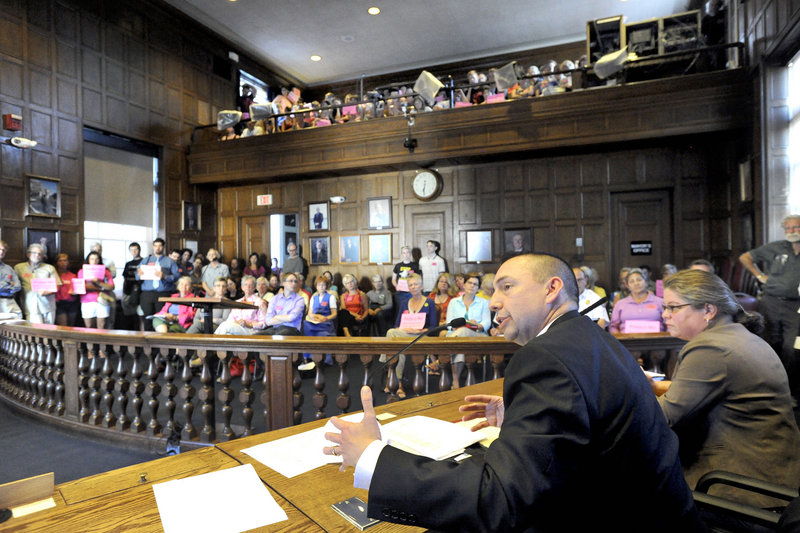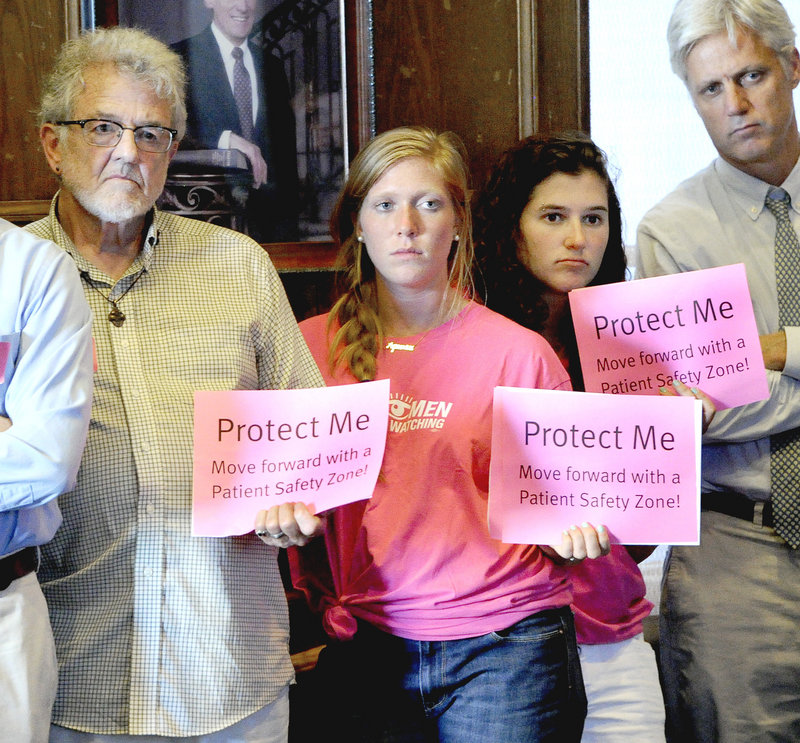PORTLAND – Planned Parenthood’s request for a buffer zone to shield patients from anti-abortion protesters has pushed city officials to weigh the dueling rights of citizens to speak freely and to access health care.
More than 120 supporters of Planned Parenthood packed a meeting Tuesday evening at City Hall as a City Council committee considered possible steps to passing an ordinance that would establish a “patient safety zone” in front of the clinic at 443 Congress St.
Each Friday morning for more than a year, 10 to 25 protesters have harassed and intimidated patients as they have entered and left the clinic, said city and Planned Parenthood officials. More recently, the protests have expanded to Saturday mornings.
“I can’t even begin to imagine how it might feel,” said Councilor Cheryl Leeman. “It has to be absolutely frightening.”
The protesters have broken no laws and have responded to police oversight, so no one has been arrested, Police Chief Michael Sauschuck told the council’s Public Safety, Health and Human Services Committee.
But Sauschuck and other officials described protesters holding pictures of aborted fetuses, yelling biblical threats of damnation, photographing and videotaping patients as they arrive and leave, and following people down the sidewalk offering pamphlets, all in the public right of way.
Among 161 Planned Parenthood patients who have been surveyed since November, 110 said they felt intimidated or harassed by the protesters, 150 said the protesters made them feel uncomfortable, and 158 said they would support a 35-foot buffer.
Councilor John Coyne compared the protesters to schoolyard bullies.
“(Patients) shouldn’t be subjected to whatever’s going on there,” Coyne said. “I understand that people have a right to protest (and) maybe all the things that go on there I’m not supportive of.” But patients have a right to access health care, he said.
Councilor Jill Duson said she first obtained birth control at a Planned Parenthood clinic when she was 17 and has worked for the organization in the past. But she’s a lawyer with a “passion” for the Constitution and the First Amendment, she said.
“I come to this very, very conflicted,” Duson said, noting that patients shouldn’t have to “run a gauntlet” of protesters to see a doctor or nurse.
The protesters’ goal is to intimidate, she said, and the city may infringe on their free speech rights “if we push them so far away that they have no impact.”
The U.S. Supreme Court agreed last month to hear an appeal of a similar law passed in Massachusetts in 2007 to create 35-foot buffer zones around the entrances and driveways to reproductive health clinics.
The high court has upheld three similar laws in other states, dating back to 1995, but there’s no telling how the current justices will rule, said Trish McAllister, the city’s neighborhood prosecutor.
A decision on Massachusetts’ law could take as long as two years, she said.
In the meantime, similar laws across the country are in the spotlight, McAllister said, and if Portland approved a buffer ordinance, it likely would be challenged in court and be subject to a temporary restraining order.
Councilor Edward Suslovic, the committee chairman, asked for additional information, including potential impacts of a buffer zone on other health care facilities and options for the city’s response if a buffer zone is approved and then challenged in court.
The committee will revisit the issue in October, Suslovic said.
The committee took no comment from the audience. Planned Parenthood supporters wearing pink T-shirts and carrying signs filled the council chamber and its balcony. There were no apparent opponents of a buffer zone at the meeting.
Leslie Sneddon and Donna Hebert, two regular protesters in Portland, said Monday that if the city adopts a buffer zone, they will fight it in court.
Eric Covey, grass-roots organizer for Planned Parenthood in Maine, said abortions account for 2 percent of the health care services provided by clinics in Maine, New Hampshire and Vermont.
He said his organization is pleased that the council is considering the request for a patient safety zone.
Planned Parenthood supporters at the meeting included six members of Maine Grandmothers for Reproductive Rights, a group that advocates to secure access to reproductive rights.
“We’re all of an age where we understand what it was like to live without the ability to legally obtain birth control and reproductive health care,” said Andrea Hanson, 72, of Arrowsic, before the meeting.
“We don’t want that to happen again to our daughters and granddaughters,” Hanson said.
Kelley Bouchard can be contacted at 791-6328 or at:
kbouchard@pressherald.com
Send questions/comments to the editors.




Success. Please wait for the page to reload. If the page does not reload within 5 seconds, please refresh the page.
Enter your email and password to access comments.
Hi, to comment on stories you must . This profile is in addition to your subscription and website login.
Already have a commenting profile? .
Invalid username/password.
Please check your email to confirm and complete your registration.
Only subscribers are eligible to post comments. Please subscribe or login first for digital access. Here’s why.
Use the form below to reset your password. When you've submitted your account email, we will send an email with a reset code.